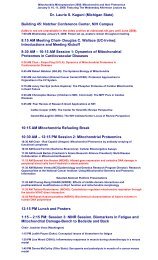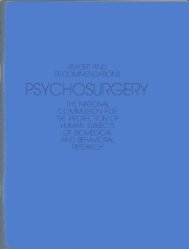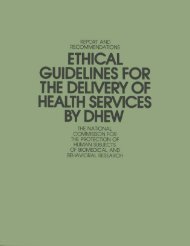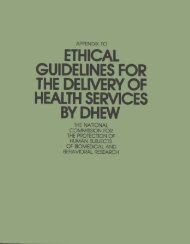RESEARCH ON THE FETUS - National Institutes of Health
RESEARCH ON THE FETUS - National Institutes of Health
RESEARCH ON THE FETUS - National Institutes of Health
You also want an ePaper? Increase the reach of your titles
YUMPU automatically turns print PDFs into web optimized ePapers that Google loves.
abortion and that a statement, signed by the woman, that she is not planning<br />
an abortion supplies conclusive evidence on the point. Such an arrangement<br />
would not be immune from attack in light <strong>of</strong> the Roe v . Wade decision, but it<br />
would raise fewer questions, Pr<strong>of</strong>essor Capron states, if it were a condition <strong>of</strong><br />
government funding.<br />
In accordance with his views concerning permissible research on the fetus<br />
in utero, Dean Wilson expresses the belief that the woman should be permitted to<br />
consent only to therapeutic research and nontherapeutic research that imposes no<br />
risk.<br />
The Nonviable Fetus Ex Utero. Pr<strong>of</strong>essor Capron notes that the law generally<br />
does not distinguish between viability and nonviability after birth. Full<br />
protection as a person is given, notwithstanding that immaturity may preclude<br />
the nonviable fetus from having an independent existence. Pr<strong>of</strong>essor Capron suggests<br />
that legislative consideration <strong>of</strong> the concept <strong>of</strong> viability as currently<br />
understood might lead to distinctions being made on that basis.<br />
With respect to consent, Pr<strong>of</strong>essor Capron states that the same rules would<br />
apply for therapeutic research on the viable fetus as for such research on the<br />
viable infant. For nontherapeutic research on the nonviable fetus, he suggests<br />
that judicial review might be appropriate.<br />
29











